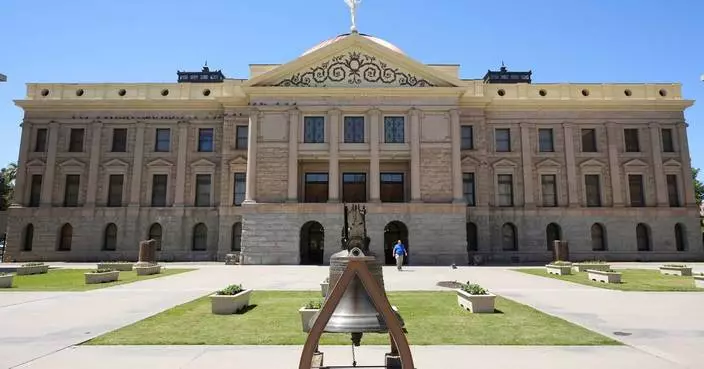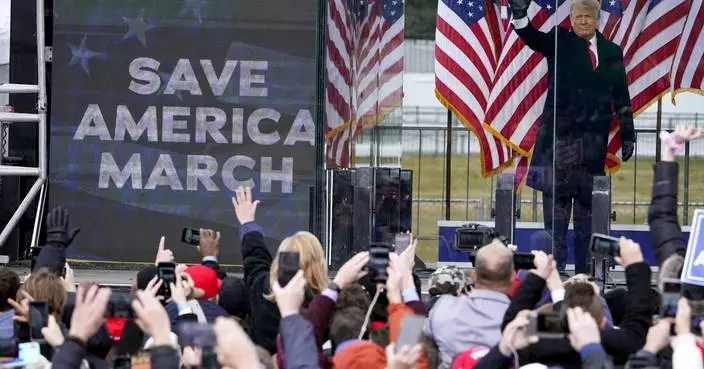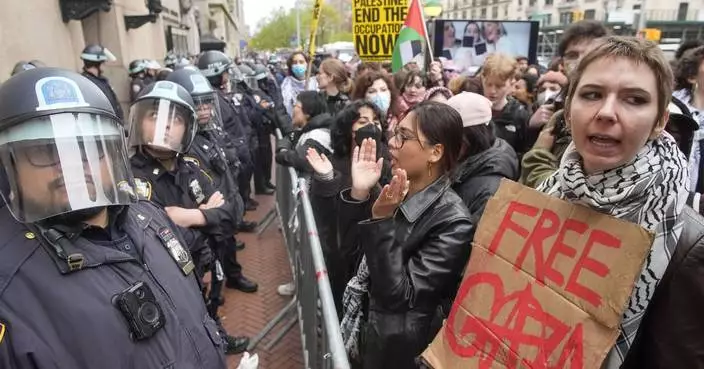One by one, 14 members of the U.N. Security Council spoke out against President Donald Trump's decision to recognize Jerusalem as the capital of Israel at an emergency meeting on Friday, some with regret and some with anger at the 15th member, the United States.
It wasn't the first time that the U.S. stood alone in defending its close ally, Israel, in the U.N.'s most powerful body. Over decades, it has vetoed many council resolutions it viewed as harmful to Israel.
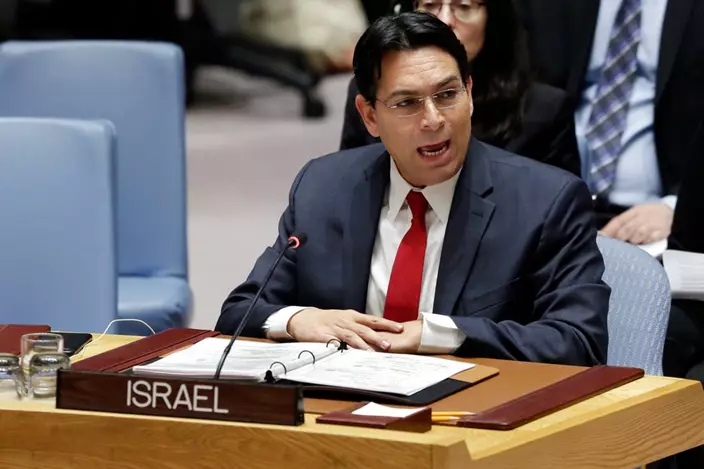
Israel's U.N. Ambassador Danny Dannon speaks in the Security Council at United Nations headquarters, Friday, Dec. 8, 2017. (AP Photo/Richard Drew)
But this was a rare rebuke for an action the United States took that in the eyes of the rest of the council and most of the world clearly violates U.N. resolutions and decisions that Jerusalem is an issue to be resolved by Israel and the Palestinians in peace negotiations on a two-state solution.
The Trump administration has been working on a new Mideast peace proposal and U.S. Ambassador Nikki Haley told the council that the U.S. is more committed to peace "than we've ever been before — and we believe we might be closer to that goal than ever before."
She gave no details but noted that past Israeli-Palestinian agreements have been signed on the White House lawn, and if there is a new agreement there is "a good likelihood" it will be signed there as well "because the United States has credibility of both sides."
But Palestinian U.N. Ambassador Riyad Mansour who spoke after council members said the Trump administration's decision on recognition "undermines and essentially disqualifies its leadership role to seek peace in the region."
He said "one party cannot continue to monopolize the peace process," especially one that is biased in favor of "the occupying power," Israel.
Mansour urged the Security Council to denounce what he called the "irresponsible" U.S. decision and reaffirm its position on the status of Jerusalem __ that the holy city's status must be decided during Israeli-Palestinian peace negotiations. And it must "affirm its rejection of all violations of that status," he said.
Israel's U.N. Ambassador Danny Danon, speaking immediately afterward, praised Trump's courage and urged all nations to follow the United States by recognizing Jerusalem as the capital of Israel and moving their embassies to the holy city.
"There will never be peace without Jerusalem as the capital of the state of Israel," he said. "And that will never change."
Traditional U.S. allies in the Security Council, including Britain, France, Sweden, Italy and Japan, criticized Trump's decision, all insisting that Jerusalem's status must remain unresolved until final Israeli-Palestinian negotiations.
In a joint statement, ambassadors from France, Italy, Germany, Sweden and Britain disagreed with Trump's decision, saying "it is not in line with Security Council resolutions and is unhelpful in terms of prospects for peace in the region."
France's U.N. Ambassador Francois Delattre expressed regret at the U.S. decision, citing legal grounds, its impact on efforts to reach a two-state solution, and the potential escalation of violence.
He said the United States must explain how Trump's action aligns with the legal foundation "on which all peace efforts are based."
Egypt's U.N. Ambassador Amr Abdellatif Aboulatta called the U.S. recognition "a dangerous precedent," saying "Jerusalem is a city under occupation and it is not permissible legally to take any action."
The statement from the five ambassadors, echoing many speakers, called for calm "given the volatile situation on the ground."
The U.N.'s Mideast envoy Nikolay Mladenov, who briefed the council, called for urgent international efforts to advance Israeli-Palestinian peace, warning that if the conflict isn't resolved "it risks being engulfed in the vortex of religious radicalism throughout the Middle East."
He said there is a risk of escalating violence following Trump's decision and "a serious risk" of "a chain of unilateral actions" that would push the goal of peace further away.
Bolivia's U.N. Ambassador Sasha Llorenty Soliz said the U.S. leader's unilateral action affects the multi-cultural and multi-religious identity of Jerusalem and "is extremely damaging — it's irresponsible because it further exacerbates the already unstable situation in the Middle East."
WASHINGTON (AP) — President Joe Biden said Wednesday that he was immediately rushing badly needed weaponry to Ukraine as he signed into law a $95 billion war aid measure that also included assistance for Israel, Taiwan and other global hot spots.
The announcement marked an end to the long, painful battle with Republicans in Congress over urgently needed assistance for Ukraine, with Biden promising that U.S. weapons shipment would begin making the way into Ukraine “in the next few hours.”
“We rose to the moment, we came together, and we got it done," Biden said a White House event to announce the bill signing. "Now we need to move fast, and we are.”
But significant damage has been done to the Biden administration’s effort to help Ukraine repel Russia’s invasion during the funding impasse that dates back to August, when the Democratic president made his first emergency spending request for Ukraine. Even with a burst of new weapons and ammunition, it's unlikely Ukraine will immediately recover after months of setbacks.
Biden immediately approved sending Ukraine $1 billion in military assistance, the first installment from about $61 billion allocated for Ukraine. The package includes air defense capabilities, artillery rounds, armored vehicles and other weapons to shore up Ukrainian forces who have seen morale sink as Russian President Vladimir Putin has racked up win after win.
Meanwhile, Ukraine for the first time has begun using long-range ballistic missiles provided secretly by the United States, bombing a Russian military airfield in Crimea last week and Russian forces in another occupied area overnight, American officials confirmed Wednesday. The U.S. is providing more of the Army Tactical Missile System, known as ATACMS, in the new military package, according to one official who was not authorized to comment and spoke on the condition of anonymity.
Still, longer term, it remains uncertain if Ukraine, after months of losses and massive damage to its infrastructure, can make enough progress to sustain American political support before burning through the latest influx of money.
White House national security adviser Jake Sullivan cautioned that even as new U.S. aid flows into Ukraine, it's possible that Russia will continue to make tactical gains in the weeks ahead.
“The fact is that it’s going to take some time for us to dig out of the hole that was created by six months of delay,” he said.
Tucked into the measure is a provision that gives TikTok’s Beijing-based parent company, ByteDance, nine months to sell it or face a nationwide prohibition in the United States. The administration and a bipartisan group of lawmakers have called the social media site a growing national security concern, which ByteDance denies.
The bill includes about $26 billion in aid for Israel and about $1 billion in humanitarian relief for Palestinians in Gaza as the Israel-Hamas war continues. Biden said Israel must ensure the humanitarian aid for Palestinians in bill reaches the Hamas-controlled territory “without delay.”
House Speaker Mike Johnson, R-La., delayed the aid package for months as members of his party's far right wing, including Reps. Marjorie Taylor Greene of Georgia and Thomas Massie of Kentucky, threatened to move to oust him if he allowed a vote to send more assistance to Ukraine. Those threats persist.
Donald Trump, the presumptive Republican presidential nominee, has complained that European allies have not done enough for Ukraine. While the former president stopped short of endorsing the funding package, his tone has shifted in recent days, acknowledging that Ukraine's survival is important to the United States.
Many European leaders have long been nervous that a second Trump term would mean decreased U.S. support for Ukraine and NATO. The European anxiety was heightened in February when Trump in a campaign speech warned NATO allies that he “would encourage” Russia to "do whatever the hell they want” to countries that don't meet defense spending goals if he returns to the White House.
It was a key moment in the debate over Ukraine spending. NATO Secretary-General Jens Stoltenberg quickly called out Trump for putting “American and European soldiers at increased risk.” But in reality, the White House maneuvering to win additional funding for Ukraine started months earlier.
Biden, the day after returning from a trip to Tel Aviv following Hamas militants' Oct. 7 attack on Israel, used a prime-time address to make his pitch for the funding.
At the time, the House was in chaos because the Republican majority had been unable to select a speaker to replace Rep. Kevin McCarthy, R-Calif., who had been ousted weeks earlier at the urging of restive legislators on the right.
Far-right Republicans have adamantly opposed sending more money for Ukraine, with the war appearing to have no end in sight. Biden in August requested more than $20 billion to keep aid flowing into Ukraine, but the money was stripped out of a must-pass spending bill.
By late October, Republicans finally settled on Johnson, a low-profile Louisiana Republican whose thinking on Ukraine was opaque, to serve as the next speaker. Biden during his congratulatory call with Johnson urged him to quickly pass Ukraine aid and began a monthslong, largely behind-the-scenes effort to bring the matter to a vote.
In private conversations with Johnson, Biden and White House officials leaned into the stakes for Europe if Ukraine were to fall to Russia. On explicit orders from Biden, White House officials also avoided directly attacking Johnson over the stalled aid.
Biden praised Johnson and Senate Minority Leader Mitch McConnell, R-Ky., saying in the end they “stepped up and did the right thing.”
“History will remember this moment," he said.
At frustrating moments during the negotiations, Biden urged his aides to “just keep talking, keep working,” according to a senior administration official, who insisted on anonymity to discuss internal discussions.
So they did. In a daily meeting convened by White House chief of staff Jeff Zients, the president's top aides would brainstorm possible ways to better make the case about Ukraine’s dire situation in the absence of aid.
The White House also sought to accommodate Johnson and his various asks. For instance, administration officials at the speaker's request briefed Reps. Chip Roy, R-Texas, and Ralph Norman, R-S.C., two conservatives who were persistent antagonists of Johnson.
In public, the administration deployed a strategy of downgrading intelligence that demonstrated Russia's efforts to tighten its ties with U.S. adversaries China, North Korea and Iran to fortify Moscow's defense industrial complex and get around U.S. and European sanctions.
The $61 billion can help triage Ukrainian forces, but Kyiv will need much more for a fight that could last years, military experts say.
Realistic goals for the months ahead for Ukraine — and its allies — include avoiding the loss of major cities, slowing Russia's momentum and getting to Kyiv additional weaponry that could help them go on the offensive in 2025, said Bradley Bowman, a defense strategy and policy analyst at the Foundation for the Defense of Democracies in Washington.
“I think Ukrainian success is not guaranteed,” Bowman said, "but Russian success is if we stop supporting Ukraine."
Biden lamented that the package did not include money to bolster U.S. border security. The White House had proposed including in the package provisions it said would have helped stem the tide of migrants and asylum seekers coming to the U.S. Republicans, however, rejected the proposal at the urging of Trump, who did not want to give Biden the win on an issue that’s been an albatross for the Democratic administration.
Associated Press writers Lolita C. Baldor, Haleluya Hadero, Mary Clare Jalonick and Darlene Superville contributed to this report.
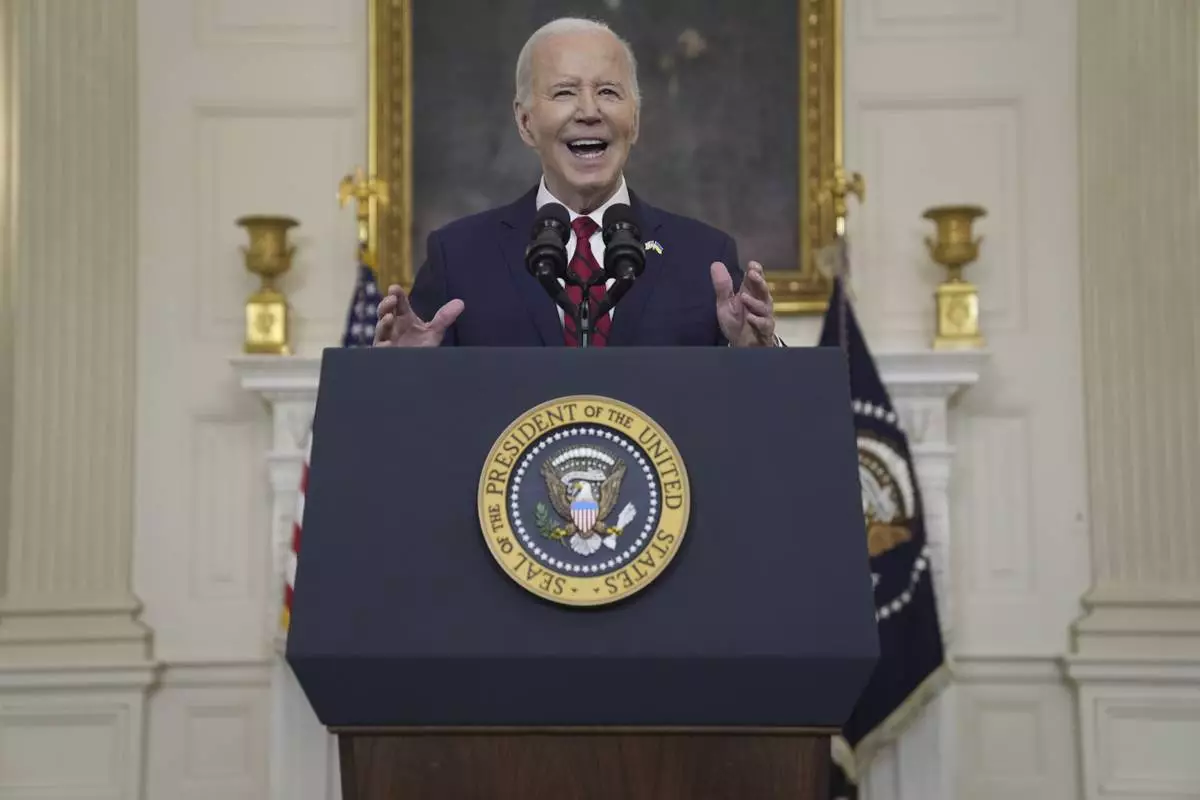
President Joe Biden speaks before signing a $95 billion Ukraine aid package that also includes support for Israel, Taiwan, and other allies, in the State Dining Room of the White House, Wednesday, April 24, 2024, in Washington. (AP Photo/Evan Vucci)
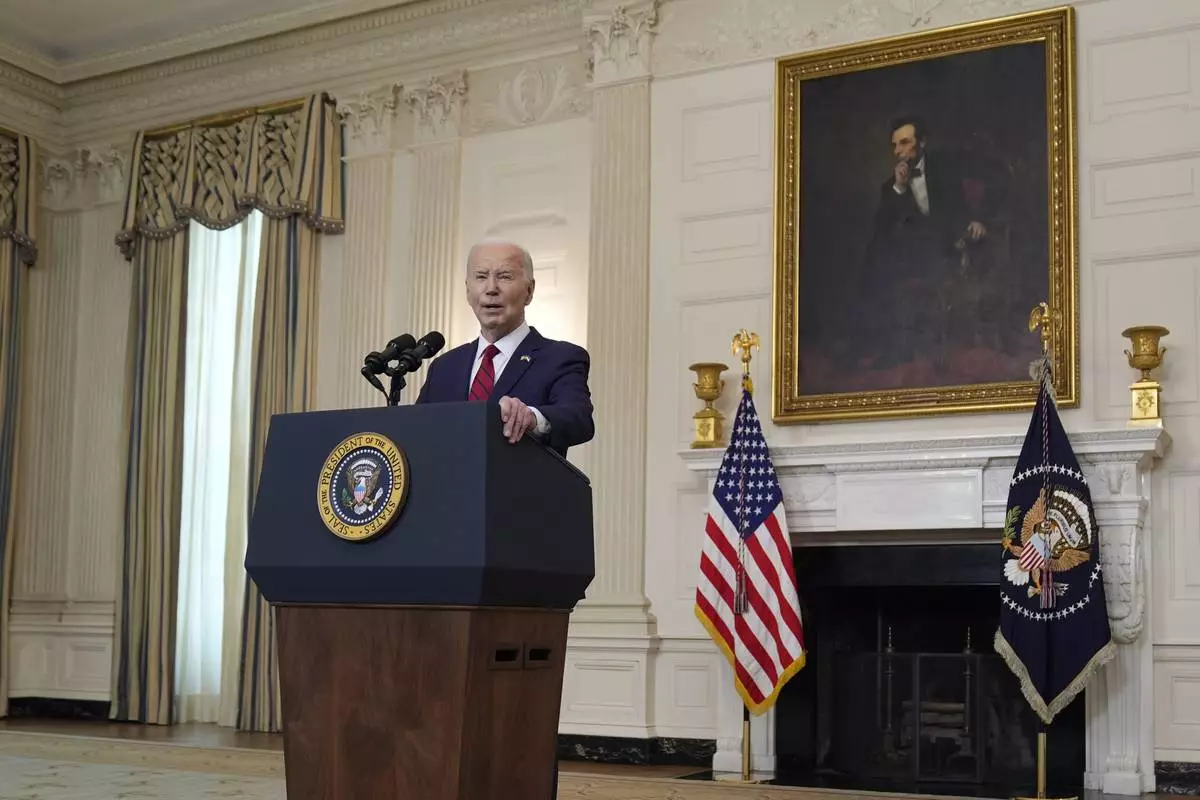
President Joe Biden speaks before signing a $95 billion Ukraine aid package that also includes support for Israel, Taiwan, and other allies, in the State Dining Room of the White House, Wednesday, April 24, 2024, in Washington. (AP Photo/Evan Vucci)
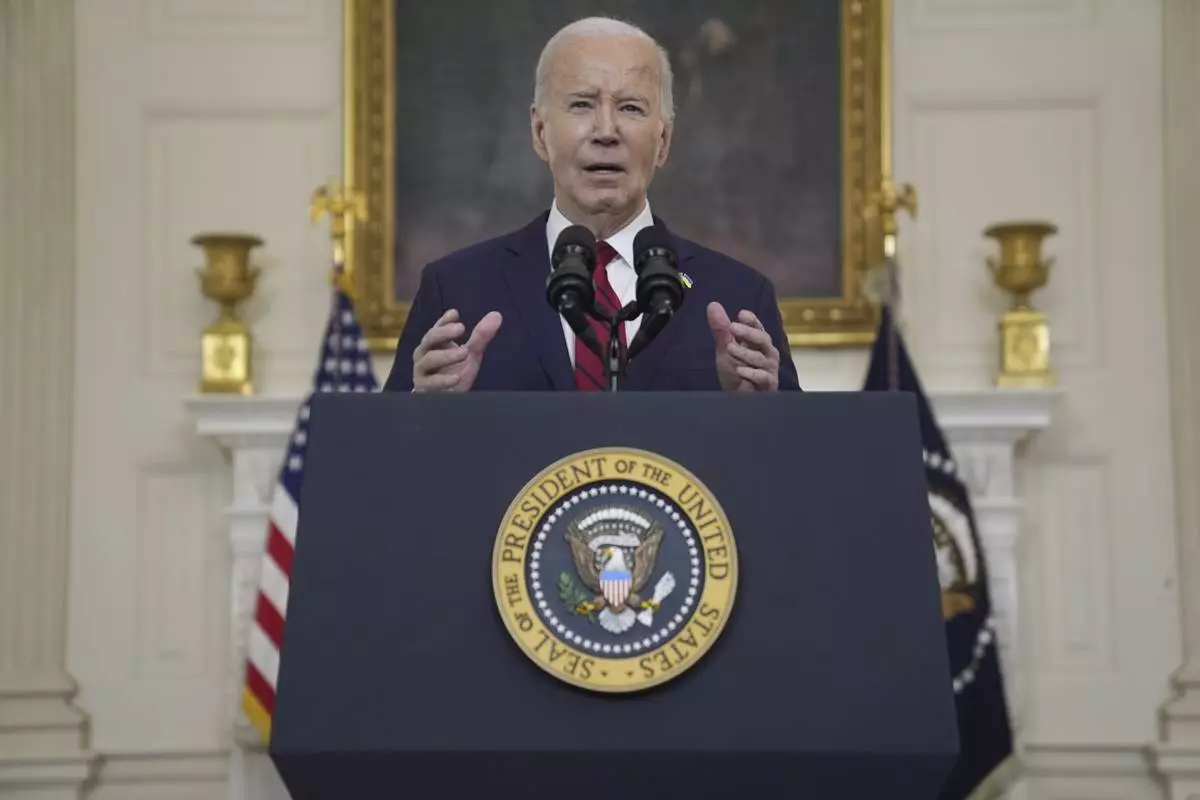
President Joe Biden speaks before signing a $95 billion Ukraine aid package that also includes support for Israel, Taiwan, and other allies, in the State Dining Room of the White House, Wednesday, April 24, 2024, in Washington. (AP Photo/Evan Vucci)
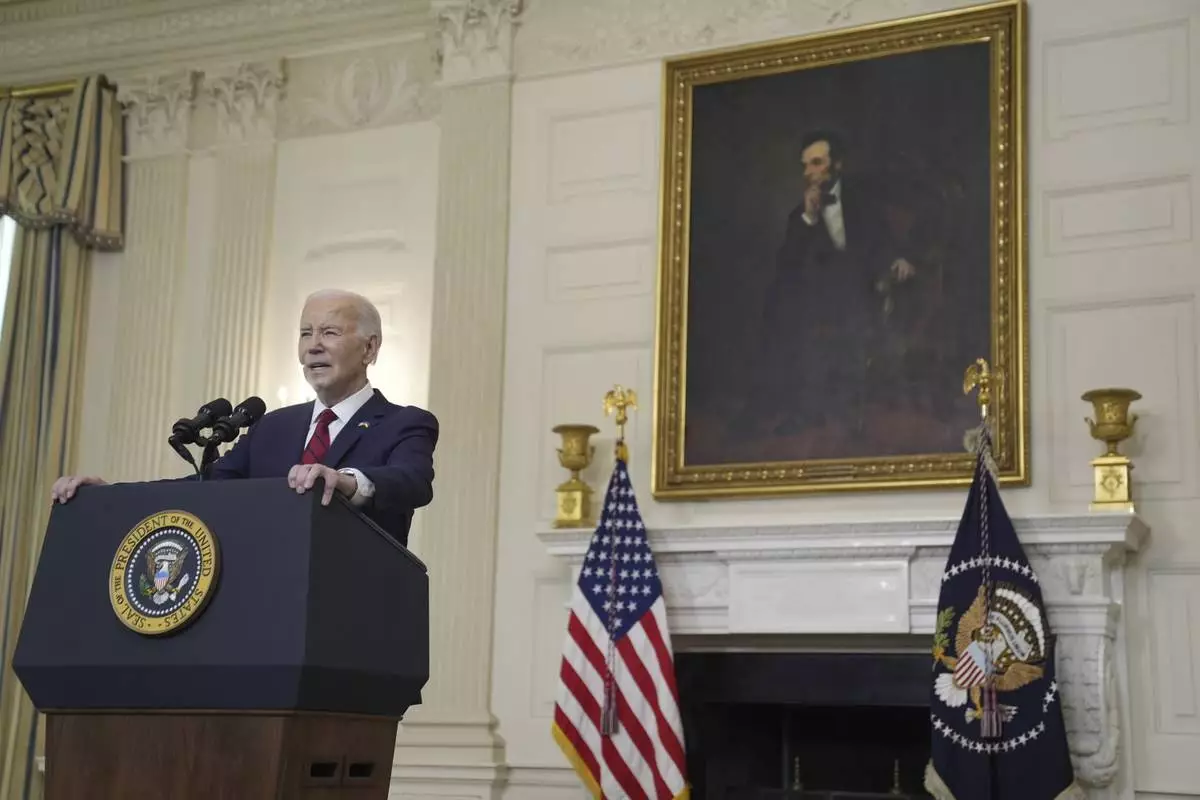
President Joe Biden speaks before signing a $95 billion Ukraine aid package that also includes support for Israel, Taiwan, and other allies, in the State Dining Room of the White House, Wednesday, April 24, 2024, in Washington. (AP Photo/Evan Vucci)
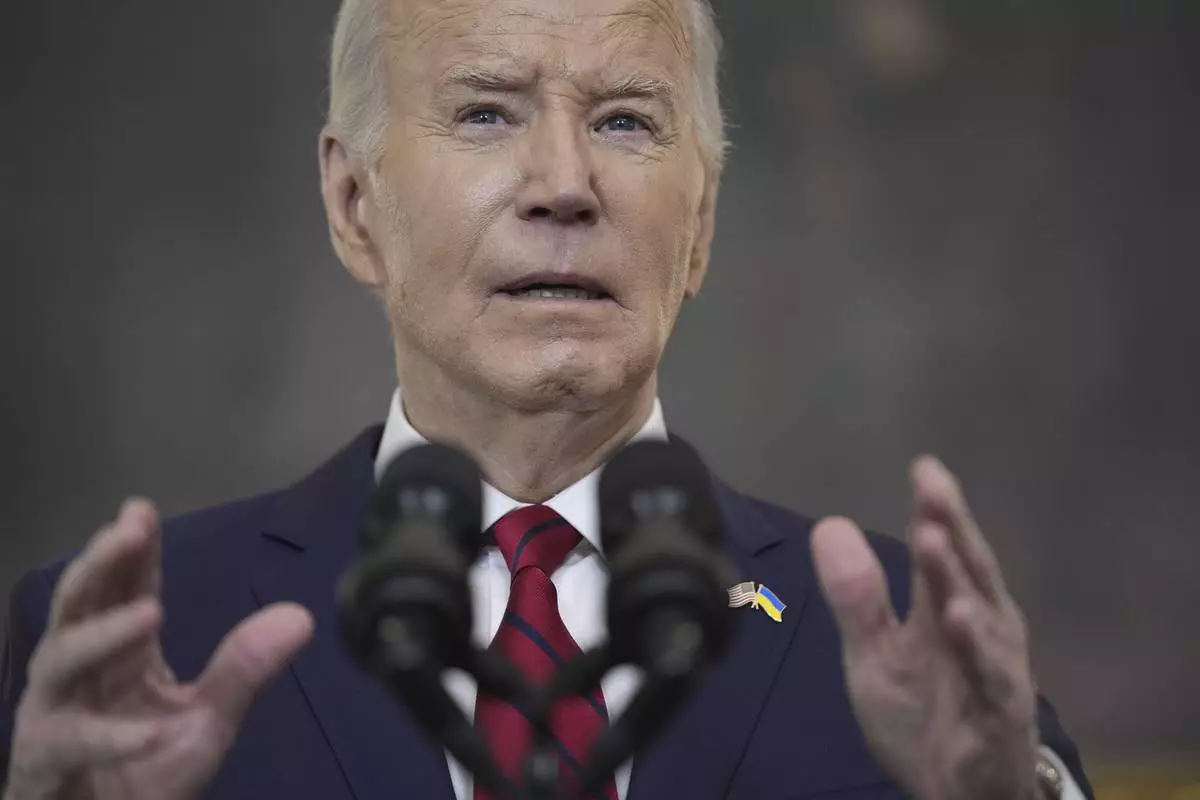
President Joe Biden speaks before signing a $95 billion Ukraine aid package that also includes support for Israel, Taiwan, and other allies, in the State Dining Room of the White House, Wednesday, April 24, 2024, in Washington. (AP Photo/Evan Vucci)
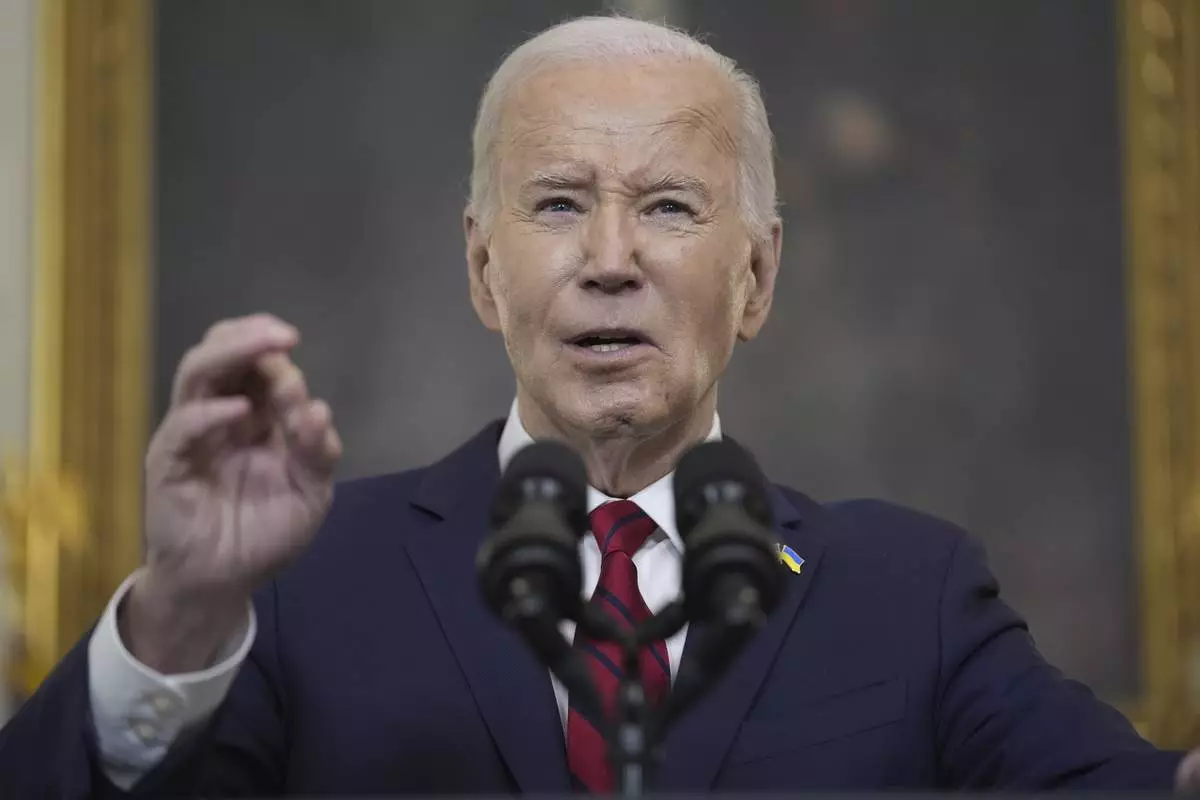
President Joe Biden speaks before signing a $95 billion Ukraine aid package that also includes support for Israel, Taiwan, and other allies, in the State Dining Room of the White House, Wednesday, April 24, 2024, in Washington. (AP Photo/Evan Vucci)
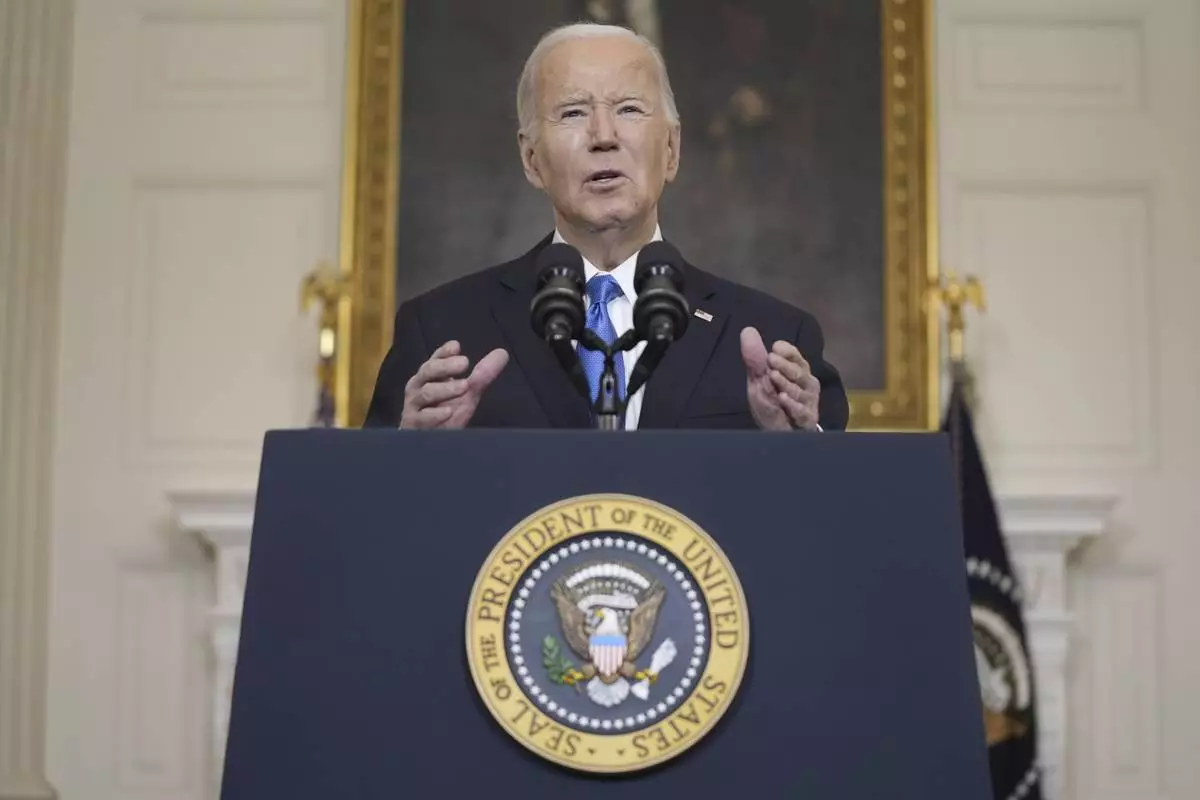
FILE - President Joe Biden speaks about a $95 billion aid package that would help Ukraine in their war against Russia, in the State Dining Room of the White House, Feb. 13, 2024, in Washington. (AP Photo/Evan Vucci)











